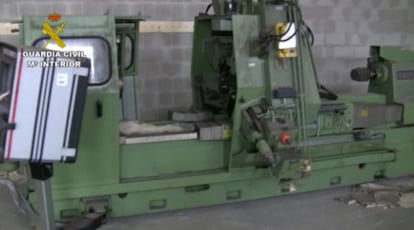Civil Guard busts ring that planned to export missile-making equipment to Iran
Three Spaniards and one Iranian arrested in Operation Terracotta

Spain’s Civil Guard has dismantled a network that was attempting to export industrial equipment that could have been used to manufacture missiles to Iran. As part of the operation, the authorities have arrested four people in Barcelona, Tarragona and Palma de Mallorca. Three of those detained are Spanish nationals from the same family – a father in his seventies and his son and daughter, both aged over 40 – while the fourth is a 47-year-old Iranian. None of them have criminal records.
The organization is also suspected of having sent technological information involving engineering plans and projects to Iran via a complex web of companies. The detainees are likely to be charged with crimes of belonging to a criminal organization, smuggling prohibited materials and money laundering.
The officers involved in so-called Operation Terracotta have seized two industrial machines used for manipulating metals. Manufactured by Leifeld, the apparatus can be used for both civil and military purposes, such as making fire extinguishers, in the case of the former, or in the construction of nuclear weapons, in the case of the latter.
The authorities also confiscated €10,000 of cash, in both euros and Iranian currency
The authorities also confiscated €10,000 of cash, in both euros and Iranian currency; a large amount of computer storage devices; and documents relating to the export and sale of defense material.
The police began the operation last year, when officers became aware of the acquisition of the two machines from a UK defense company. The Civil Guard subsequently found out that the machines had been brought into Spain illegally, with the aim of hiding their true destination and the hypothetical intention of awaiting the most opportune moment to send them to Iran.
It has not yet been confirmed whether the machines were destined for military use. However, investigators believe this to be the most likely scenario given that no export licenses had been secured for them, which is the usual procedure with machinery destined for civil use.
The machines in question can be used to manufacture missile casings, as well as elements used in the process of enriching uranium. As such they are covered by a number of different export controls, such as the Nuclear Suppliers Group and the Missile Technology Control Regime.







































